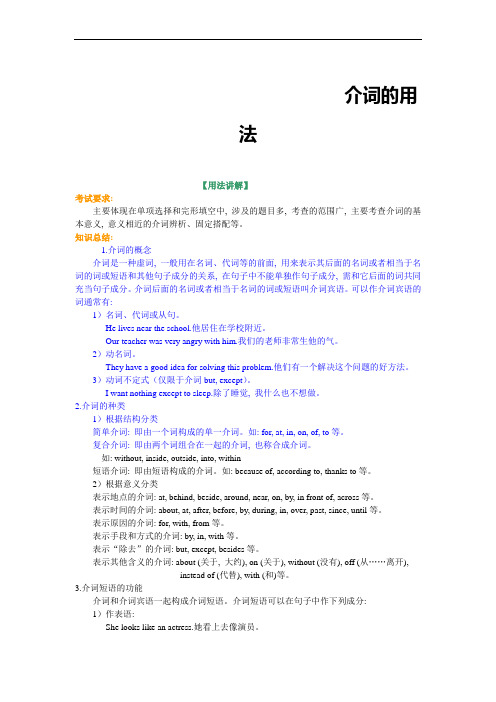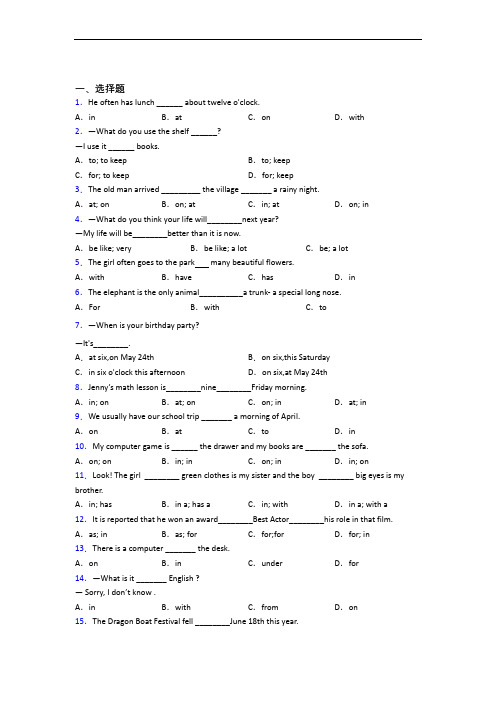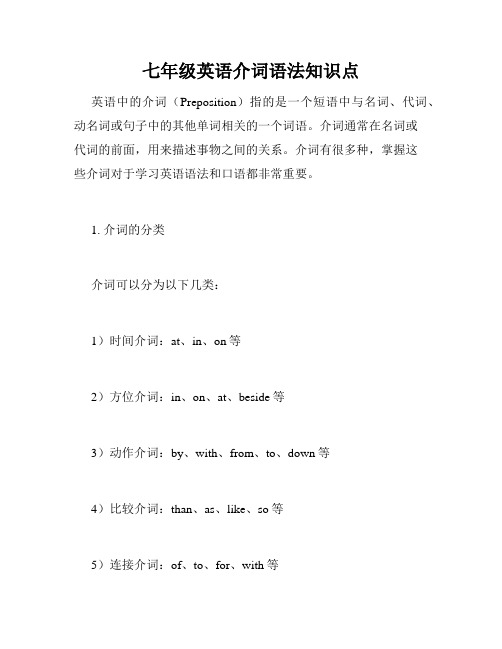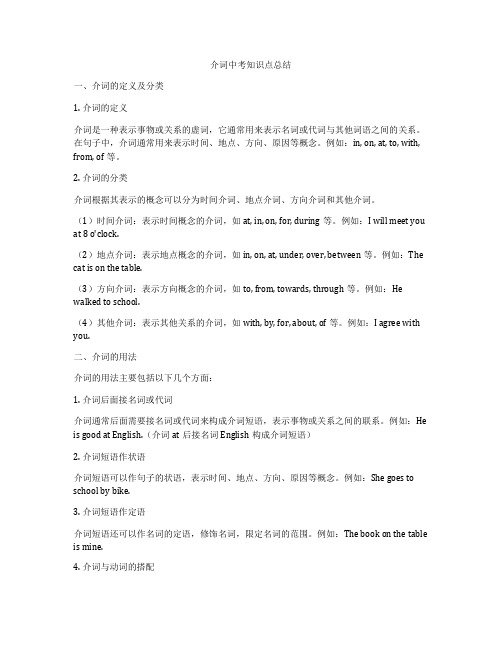初中英语语法知识—介词的分类汇编附解析(2)
初中英语语法——介词的用法

介词的用法【用法讲解】考试要求:主要体现在单项选择和完形填空中, 涉及的题目多, 考查的范围广, 主要考查介词的基本意义, 意义相近的介词辨析、固定搭配等。
知识总结:1.介词的概念介词是一种虚词, 一般用在名词、代词等的前面, 用来表示其后面的名词或者相当于名词的词或短语和其他句子成分的关系, 在句子中不能单独作句子成分, 需和它后面的词共同充当句子成分。
介词后面的名词或者相当于名词的词或短语叫介词宾语。
可以作介词宾语的词通常有:1)名词、代词或从句。
He lives near the school.他居住在学校附近。
Our teacher was very angry with him.我们的老师非常生他的气。
2)动名词。
They have a good idea for solving this problem.他们有一个解决这个问题的好方法。
3)动词不定式(仅限于介词but, except)。
I want nothing except to sleep.除了睡觉, 我什么也不想做。
2.介词的种类1)根据结构分类简单介词: 即由一个词构成的单一介词。
如: for, at, in, on, of, to等。
复合介词: 即由两个词组合在一起的介词, 也称合成介词。
如: without, inside, outside, into, within短语介词: 即由短语构成的介词。
如: because of, according to, thanks to等。
2)根据意义分类表示地点的介词: at, behind, beside, around, near, on, by, in front of, across等。
表示时间的介词: about, at, after, before, by, during, in, over, past, since, until等。
表示原因的介词: for, with, from等。
语法归纳介词的分类与用法

语法归纳介词的分类与用法介词是英语语法中的一类虚词,用于连接名词、代词、动词或其他词组,起到指示、限定或补充的作用。
在日常交流中,正确使用介词可以使句子更加准确、通顺,并且更好地表达自己的意思。
本文将对常见的介词分类和用法进行归纳总结。
一、位置介词(Prepositions of Place)1. On(在……上面):- 表示某物处于平面上,例如:on the table(在桌子上)- 表示某物在某个交通工具上,例如:on the bus(在公交车上)2. In(在……里面):- 表示某物处于空间之中,例如:in the room(在房间里)- 表示某物位于某地,例如:in Beijing(在北京)3. At(在……处):- 表示某物在某个具体位置,例如:at the park(在公园里)- 表示某个时间点,例如:at 9 o'clock(在九点)4. Under(在……下面):- 表示某物处于其他物体下方,例如:under the bed(在床底下)- 表示某物位于某个地理位置下方,例如:under the bridge(在桥下)二、方向介词(Prepositions of Direction)1. To(到……):- 表示向某个地点移动,例如:go to the cinema(去电影院)- 表示给予某人或某物,例如:give the book to Tom(把书给了汤姆)2. From(从……来):- 表示从某个地点出发,例如:come from Beijing(从北京来) - 表示某物来源于某处,例如:a gift from my friend(来自我朋友的礼物)3. Into(进入……内):- 表示进入或穿过某个空间,例如:jump into the pool(跳进游泳池)- 表示某物转化为另一种状态,例如:transform into a butterfly (变成蝴蝶)4. Out of(离开……):- 表示离开某个地点,例如:get out of the car(从车里出来)- 表示摆脱某种状态或限制,例如:break out of prison(越狱)三、时间介词(Prepositions of Time)1. In(在……时):- 表示某个具体时间段,例如:in the morning(在早上)- 表示某个季节或年份,例如:in summer(在夏季)2. On(在……日):- 表示具体的某一天,例如:on Monday(在星期一)- 表示节日或特殊的日期,例如:on Christmas Day(在圣诞节)3. At(在……点):- 表示具体的某个时间点,例如:at 2 p.m.(在下午两点)- 表示某个时刻,例如:at midnight(在午夜)4. For(持续时间):- 表示持续的一段时间,例如:study for two hours(学习两个小时) - 表示某事发生的时间跨度,例如:for the whole week(整个星期)四、原因介词(Prepositions of Reason)1. Because of(因为):- 表示某个原因导致某个结果,例如:He couldn't come because of the bad weather(因为天气不好,他不能来)2. Due to(由于):- 表示某个原因导致某个结果,具有正式文体,例如:The train was delayed due to heavy rain(由于大雨,火车晚点了)3. Owing to(由于):- 与 due to 同义,用法上稍显书面,例如:The match was canceled owing to the lack of players(由于队员不足,比赛被取消)五、方式介词(Prepositions of Manner)1. By(通过、以……方式):- 表示某种方法或手段,例如:travel by plane(乘飞机旅行)- 表示某种交通方式,例如:go to work by bus(乘公交车上班)2. With(用……方式):- 表示伴随或使用某种物品,例如:write with a pen(用钢笔写)六、比较介词(Prepositions of Comparison)1. Like(像):- 表示类似、相似,例如:She looks like her mother(她长得像她妈妈)- 表示比较相近的程度,例如:It tastes like chicken(尝起来像鸡肉)2. Unlike(与……不同):- 较 like 相反,表示与某事物不同,例如:He is unlike his brother in personality(他的性格与他弟弟不同)以上是常见的介词分类和用法总结。
初中英语语法知识—介词的分类汇编及答案(2)

一、选择题1.He often has lunch ______ about twelve o'clock.A.in B.at C.on D.with 2.—What do you use the shelf ______?—I use it ______ books.A.to; to keep B.to; keepC.for; to keep D.for; keep3.The old man arrived _________ the village _______ a rainy night.A.at; on B.on; at C.in; at D.on; in 4.—What do you think your life will________next year?—My life will be________better than it is now.A.be like; very B.be like; a lot C.be; a lot5.The girl often goes to the park many beautiful flowers.A.with B.have C.has D.in6.The elephant is the only animal__________a trunk- a special long nose.A.For B.with C.to7.—When is your birthday party?—It's________.A.at six,on May 24th B.on six,this SaturdayC.in six o'clock this afternoon D.on six,at May 24th8.Jenny’s math lesson is________nine________Friday morning.A.in; on B.at; on C.on; in D.at; in9.We usually have our school trip _______ a morning of April.A.on B.at C.to D.in10.My computer game is ______ the drawer and my books are _______ the sofa. A.on; on B.in; in C.on; in D.in; on 11.Look! The girl ________ green clothes is my sister and the boy ________ big eyes is my brother.A.in; has B.in a; has a C.in; with D.in a; with a 12.It is reported that he won an award________Best Actor________his role in that film. A.as; in B.as; for C.for;for D.for; in 13.There is a computer _______ the desk.A.on B.in C.under D.for 14.—What is it _______ English ?—Sorry, I don’t know .A.in B.with C.from D.on15.The Dragon Boat Festival fell ________June 18th this year.A.in B.to C.on D.from16.My friend, Henry was born June 10th, 1997.A.in B.on C.at D.for17.There________ a hamburger and bananas________there.A.is;in B.are;in C.is;/ D.are;/18.They got married_______ 1960. That means they have been married _______ 1960. A.at; since B.on; in C.in; since D.for; since 19.—It's wonderful, isn't it?— Yes, The large grassland, reaching out far away, looks very beautiful________the blue and clean sky.A.against B.above C.through D.past20.He has a garden __________ a lot of flowers.A.has B.there is C.with21.(2017年安徽) To my pleasure, my family is always _____ me whatever I decide to do. A.above B.behind C.from D.through22.We started out in early spring and headed west the northern part of Asia. A.through B.between C.among D.across23.The next Olympic Games will be held in Japan________ 27th July 2020.A.on B.in C.at D.of24.I want to learn English well because I don’t want to talk with foreigners ________ anybody else.A.by B.through C.across D.at25.–Emma can go out ________ school nights but she must be back ________ ten o’clock.--Oh, I see.A.on, before B.on, after C.in, before D.in, after【参考答案】***试卷处理标记,请不要删除一、选择题1.B解析:B【解析】【分析】【详解】句意:他经常在大约十二点吃午餐。
初中英语中的常见介词解析

初中英语中的常见介词解析介词是英语中一个非常重要的词类,它用来连接名词、代词、动词等词语,并且在句子中起到标示关系的作用。
初中英语中有许多常见的介词,它们的用法和意义对于初学者来说可能会有些困惑。
本文将对初中英语中常见的介词进行解析,帮助读者更好地理解和运用这些介词。
1. in介词"in"可以表示位置、时间、状态等。
在表示位置时,它可以表示某物在某个地点内部,比如:"There is a book in the bag."(书包里有一本书);"The cat is in the box."(猫在盒子里)。
在表示时间时,它可以表示某事发生的时间点,比如:"I will arrive in ten minutes."(我将在十分钟内到达);"We usually have dinner in the evening."(我们通常在晚上吃晚饭)。
在表示状态时,例如:"I am interested in music."(我对音乐感兴趣)。
2. on介词"on"用于表示位置、时间、方式等。
在表示位置的时候,它通常表示某事物或某人在某物体的表面上,比如:"Put the book on the table."(把书放在桌子上);"The cat is sitting on the chair."(猫坐在椅子上)。
在表示时间的时候,它可以表示某事发生的具体日期或某个时间点,比如:"My birthday is on June 1st."(我的生日是在6月1日);"She will arrive on time."(她将准时到达)。
在表示方式的时候,例如:"I learned English on my own."(我自学英语)。
初中英语语法知识—介词的分类汇编含答案解析(2)

一、选择题1.I can’t go out ________ school nights because I have to finish my homework first.A.at B.in C.on2.I bought the tomatoes ________ the vegetable stall.A.at B.in C.on D.from3.—Do you know the girl ________ red skirts?—Yes, she is my sister.A.at B.on C.in D.to4.The girl often goes to the park many beautiful flowers.A.with B.have C.has D.in5.The bird’s singing came into my room ______ the window and woke me up in the early morning.A.down B.from C.through D.across6.Lily and Lucy _______ their mother. They have big eyes and yellow hair.A.like both B.both are like C.both like D.are both like 7.—Mary's birthday is ________ March. What about Lucy's?—Her birthday is ________ December 10th.A.in;on B.on;in C.on;on8.My uncle has taught in this school________ he was twenty years old.A.after B.for C.until D.since9.It’s necessary for Tony to do ____ thing ____ his classmates do.A.same, as B.same, like C.the same, to D.the same, as10.Taiwan is __________ the southeast of China and Hunan is __________ the south of Hubei. A.in;in B.in;on C.on;in D.on;to11.If you can’t read the article, it will be meaningless to you. The –less in the word “meaningless” means .A.with B.without C.full of D.out of 12.North Korea is________Asia. It’s________the northeast of China and________the west of Japan.A.in, to, on B.in, on, to C.on, in, to D.to, on, in 13.He is__________ outgoing student long hair..A.a,with, B.an,with C.a,of D.an,of 14.—What is it _______ English ?—Sorry, I don’t know .A.in B.with C.from D.on15.We usually have our school trip _______ a morning of April.A.on B.at C.to D.in16.Jim and Tim are talking _______ the phone.A.at B.on C.with D.in17.The accident took place ________ a cold February evening.A.on B.in C.at D.for18.It is not easy to cross the river ________ a ropeway.A.from B.with C.by D.on19.My daughter usually gets up at 6:00 ________ the morning, but ________ Sunday morning she gets up at 8:00.A.in; in B.in; on C.on; in D.on; on20.---Do you prefer coffee _____milk in it?---Sometimes, but most of the time I ______drink black coffee.A.or, would rather B.with, prefer C.with, would rather D.to, prefer21.If success is a gate, the road this gate must be made up of difficulties.A.towards B.against C.opposite D.beyond 22.Nature has given us the ability to learn________watching others. Children do it naturally. A.by B.in C.on23.I have to prepare ________my math test________ Friday afternoon.A.at; on B.for; on C.on ;for24.He has a garden __________ a lot of flowers.A.has B.there is C.with25.Thanks ______your family photos, they are very nice.A.to B.in C.for D.at【参考答案】***试卷处理标记,请不要删除一、选择题1.C解析:C【解析】【分析】【详解】句意:在学校我晚上不能出去,因为我必须先完成作业。
七年级英语介词语法知识点

七年级英语介词语法知识点英语中的介词(Preposition)指的是一个短语中与名词、代词、动名词或句子中的其他单词相关的一个词语。
介词通常在名词或代词的前面,用来描述事物之间的关系。
介词有很多种,掌握这些介词对于学习英语语法和口语都非常重要。
1. 介词的分类介词可以分为以下几类:1)时间介词:at、in、on等2)方位介词:in、on、at、beside等3)动作介词:by、with、from、to、down等4)比较介词:than、as、like、so等5)连接介词:of、to、for、with等6)虚拟介词:but、except、save等2. 介词的用法(1)时间介词1)at:用于具体时间点。
如at six o'clock、at night等。
2)in:用于时间段、月份、季节、年份等。
如in the morning、in January等。
3)on:用于特定日期、星期几、节日、具体部分的某一天等。
如on Monday、on Christmas Day等。
(2)方位介词1)in:用于封闭的区域、城市、国家等。
如in the room、in Beijing等。
2)on:用于表面、垂直于表面的东西、街道、公路等。
如on the table、on the wall等。
3)at:用于具体点、建筑物、特殊地名等。
如at the door、at the park等。
4)beside:在……旁边。
如beside the river。
(3)动作介词1)by:靠、在……旁边;用(交通工具)。
如by the river、by bus等。
2)with:和、带着。
如with my friends、with a book等。
3)from:从……来、从……出发。
如from China、from home等。
4)to:向、到达的地方。
如to Beijing、to school等。
5)down:顺着某个方向(向下、向南、向河边等)。
新初中英语语法知识—介词的分类汇编含解析(2)

一、选择题1.--Which is your teacher?--The one thick(厚厚的)glasses over his eyes is.A.wears B.wear C.with D.has2.—There is a hole in the wall. What is it for?—We have a dog. He can get in or out ________ it.A.past B.through C.across D.over 3.—What do you use the shelf ______?—I use it ______ books.A.to; to keep B.to; keepC.for; to keep D.for; keep4.The old man arrived _________ the village _______ a rainy night.A.at; on B.on; at C.in; at D.on; in 5.The girl often goes to the park many beautiful flowers.A.with B.have C.has D.in 6.—What do you think of happiness, Zoe?—I think happiness is a way station too much and too little.A.among B.between C.opposite D.beyond 7.--There are many theatres _________the island.--Yes, Broadway is the southern end of the island..A.at; at B.on; on C.at; on D.on; at 8.Lily often goes to visit her grandma ______ Sundays.A.at B.in C.on D.to9.Jenny’s math lesson is________nine________Friday morning.A.in; on B.at; on C.on; in D.at; in 10.My cousin Mary was born ___ a singing voice.A.from B.in C.with 11.Shanghai is ________ the east of China and _________ the west of Japan. A.in; to B.in; inC.to; to D.to; in12.The boy read English________every morning ________the age of ten.A.on; in B.on; at C.in; at; D./; at 13.My teacher runs ______ the morning. But he doesn't run ______ Sunday morning. A.in;on B.on;in C.in;in D.on;on 14.—What is it _______ English ?—Sorry, I don’t know .A.in B.with C.from D.on 15.The accident took place ________ a cold February evening.A.on B.in C.at D.for16.It is not easy to cross the river ________ a ropeway.A.from B.with C.by D.on17.Did you read the news________the newspapers that Yang Jiang passed away (去世)________the morning of May 25th?A.in; in B.on; in C.in; on D.on; on18.If success is a gate, the road this gate must be made up of difficulties.A.towards B.against C.opposite D.beyond19.—It's wonderful, isn't it?— Yes, The large grassland, reaching out far away, looks very beautiful________the blue and clean sky.A.against B.above C.through D.past20.--Excuse me, Sir. Can you tell me the way to the zoo?--Walk__________the bridge, you'll see the zoo__________your right.A.on; by B.across; at C.across; on D.on; along21.I have to prepare ________my math test________ Friday afternoon.A.at; on B.for; on C.on ;for22.Tom was born________London________May lst, 2001.A.in; in B.in; on C.on; on D.on; in 23.Don’t leave the room _____ the light on .A.in B.on C.about D.with24.I want to learn English well because I don’t want to talk with foreigners ________ anybody else.A.by B.through C.across D.at25.My best friend is now________China, so I want to go________China, too.A.in;on B.on;to C.of;for D.in;to【参考答案】***试卷处理标记,请不要删除一、选择题1.C解析:C【解析】句意:——哪一个是你的老师?——戴着厚厚的眼镜的那个。
介词中考知识点总结

介词中考知识点总结一、介词的定义及分类1. 介词的定义介词是一种表示事物或关系的虚词,它通常用来表示名词或代词与其他词语之间的关系。
在句子中,介词通常用来表示时间、地点、方向、原因等概念。
例如:in, on, at, to, with, from, of等。
2. 介词的分类介词根据其表示的概念可以分为时间介词、地点介词、方向介词和其他介词。
(1)时间介词:表示时间概念的介词,如at, in, on, for, during等。
例如:I will meet you at 8 o'clock.(2)地点介词:表示地点概念的介词,如in, on, at, under, over, between等。
例如:The cat is on the table.(3)方向介词:表示方向概念的介词,如to, from, towards, through等。
例如:He walked to school.(4)其他介词:表示其他关系的介词,如with, by, for, about, of等。
例如:I agree with you.二、介词的用法介词的用法主要包括以下几个方面:1. 介词后面接名词或代词介词通常后面需要接名词或代词来构成介词短语,表示事物或关系之间的联系。
例如:He is good at English.(介词at后接名词English构成介词短语)2. 介词短语作状语介词短语可以作句子的状语,表示时间、地点、方向、原因等概念。
例如:She goes to school by bike.3. 介词短语作定语介词短语还可以作名词的定语,修饰名词,限定名词的范围。
例如:The book on the table is mine.4. 介词与动词的搭配很多动词需要与介词搭配使用,构成固定的词组或短语。
例如:look at, listen to, think of 等。
5. 介词的固定搭配有些介词需要与特定的词搭配使用,构成特定的短语或表达特定的意思。
- 1、下载文档前请自行甄别文档内容的完整性,平台不提供额外的编辑、内容补充、找答案等附加服务。
- 2、"仅部分预览"的文档,不可在线预览部分如存在完整性等问题,可反馈申请退款(可完整预览的文档不适用该条件!)。
- 3、如文档侵犯您的权益,请联系客服反馈,我们会尽快为您处理(人工客服工作时间:9:00-18:30)。
一、选择题1.I can’t go out ________ school nights because I have to finish my homework first.A.at B.in C.on2.The old man arrived _________ the village _______ a rainy night.A.at; on B.on; at C.in; at D.on; in 3.—What do you think of happiness, Zoe?—I think happiness is a way station too much and too little.A.among B.between C.opposite D.beyond4.The elephant is the only animal__________a trunk- a special long nose.A.For B.with C.to5.--There are many theatres _________the island.--Yes, Broadway is the southern end of the island..A.at; at B.on; on C.at; on D.on; at6.She is talented ________ music but I am good at sports.A.at B.in C.on7.Taiwan is __________ the southeast of China and Hunan is __________ the south of Hubei. A.in;in B.in;on C.on;in D.on;to 8.Jenny’s math lesson is________nine________Friday morning.A.in; on B.at; on C.on; in D.at; in9.Taiwan is _________ the southeast of China.A.to B.in C.from D.on10.—When does your mother go shopping?—Usually Sunday morning.A.on B.in C.at D.after11.He is__________ outgoing student long hair..A.a,with, B.an,with C.a,of D.an,of 12.Which of the following(下面) is right?A.The boy begin to clean the room with his sister.B.In the Spring Festival, the children often get lucky money.C.How is weather like in spring there?D.You’d better not read a book in the sun.13.There is an old bridge __________the river. Be careful (小心) when you ________________ it.A.over; across B.over; cross C.on; cross D.on; across 14.(2017年安徽) To my pleasure, my family is always _____ me whatever I decide to do. A.above B.behind C.from D.through15.The river runs_______ the city. And there are many beautiful bridges_______ the river. A.across; through B.through; overC.through; through D.across; over16.He often has lunch ______ about twelve o'clock.A.in B.at C.on D.with 17.(2017年山东德州)A woman stood ______ the window, watching the children playing games in the garden.A.past B.through C.across D.by18.This pair of jeans looks nice _____ Sandy, because she looks very nice _____ blue. A.on; in B.in; on C.for; on D.to; in19.---Do you prefer coffee _____milk in it?---Sometimes, but most of the time I ______drink black coffee.A.or, would rather B.with, prefer C.with, would rather D.to, prefer 20.Did you read the news________the newspapers that Yang Jiang passed away (去世)________the morning of May 25th?A.in; in B.on; in C.in; on D.on; on21.My friend, Henry was born June 10th, 1997.A.in B.on C.at D.for22.Nature has given us the ability to learn________watching others. Children do it naturally. A.by B.in C.on23.I have to prepare ________my math test________ Friday afternoon.A.at; on B.for; on C.on ;for24.—Hi, Jane. What time do you get up __________ weekdays?—I usually get up __________ about six o’clock.A.in; at B.on; at C.at; at D.on; on25.My cousin Mary was born ___ a singing voice.A.from B.in C.with【参考答案】***试卷处理标记,请不要删除一、选择题1.C解析:C【解析】【分析】【详解】句意:在学校我晚上不能出去,因为我必须先完成作业。
考查介词。
在英语里表示具体某一天的晚上用介词on。
school night上学时晚上,night前有修饰语school,表示特定的晚上,故前时间介词用on。
故选C。
2.A解析:A【解析】【详解】句意:那位老人在一个雨夜到达了那个村庄。
本题考查介词。
at在,on在……上面,in在……里。
arrive at表示到达小地点;arrive in表示到达大地点。
到达一个小村庄,用arrive at。
表示在一个下雨的夜晚,用介词on。
故选A。
3.B解析:B【解析】【分析】【详解】句意:——Zoe,你怎样看待幸福?——我认为幸福是介于太多和太少之间的一个中转站。
考查介词辨析。
A. among在…中间,指三者或三者以上的中间;B. between在…之间,在两者之间;C. opposite在…的对面;D. beyond超过、超越。
根据I think happiness is a way station too much and too little.可知句意为“我认为幸福是介于太多和太少之间的一个中转站。
”由后面的too much and too little,可知是介于两者之间,所以应用between,故答案选B。
4.B解析:B【解析】【分析】【详解】句意:大象是唯一有象鼻的动物——一个特殊的长鼻子。
考查介词辨析。
For给,因为;with带有,和;to向,到。
根据句意,可知空处是介词短语作后置定语用,修饰animal;结合选项,可知是with a trunk修饰空前animal,意为带有象鼻的动物。
故选B。
5.D解析:D【解析】【分析】【详解】句意:——这个岛上有许多剧院_。
——是的,百老汇是在岛的最南端。
表示在某个岛上习惯用介词on,即on the island;at the end of在……的末端。
故选D。
6.B解析:B【解析】【分析】【详解】句意:她有音乐天赋,但我擅长体育。
考查介词,A. at prep. 在(表示存在或出现的地点、场所、位置、空间),以(某种价格、速度等);B. in prep. 在……里,在……以后,在……状态中,从事…..;C. on prep. 在……上,以……为目标,向,朝……,在……时候。
根据所学短语“be talented in在……有天赋”,故选B。
7.B解析:B【解析】【分析】【详解】句意:台湾省在中国的东南部,湖南省在湖北省的南部。
考查介词。
根据英语表达习惯,作表方位的介词时,in表示在范围内,on表示接壤,to表示不接壤。
台湾包含在中国版图内,故应用介词in,C、D选项可排除。
湖南省与湖北省接壤,故应用介词on,故选B。
8.B解析:B【解析】【分析】【详解】句意:詹妮的数学是在周五早晨9点。
考查介词的用法。
in后跟某年某月某个季节等;在时刻前用介词at;在具体的某一天前用介词on。
故选B。
9.B解析:B【解析】【分析】【详解】句意:台湾在中国的东南方。
考查介词的用法。
in表示在范围内;on表示接壤;to表示不接壤;from是来自。
根据句意以及常识可知,台湾在中国的东南方,在中国范围之内,故选B。
10.A解析:A【解析】【详解】on在(用于具体的某一天,或上、下午、晚上有修饰词时);in在(用于上、下午、晚上,年,月等);at在(用于某一时刻);after在……之后;这里指某天的上午或下午,晚上要用介词on。
故选A。
解析:B【解析】【分析】【详解】句意:他是一位留着长发的外向的学生。
Outgoing第一个因素是原因,所以用an; with结构作定语。
所以选B。
12.D解析:D【解析】【详解】句意:下面那一项是正确的?考查判断句子正误。
